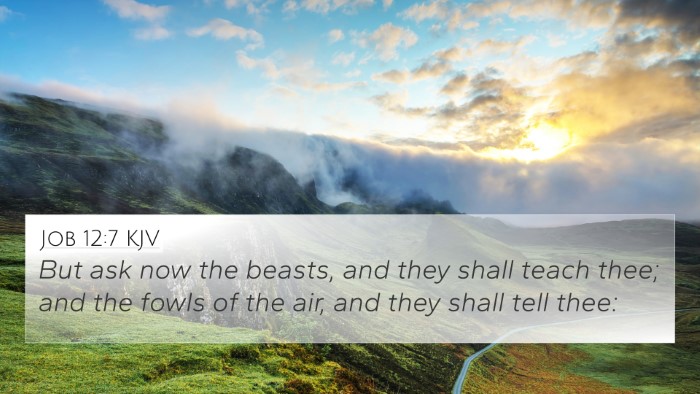Old Testament
Genesis Exodus Leviticus Numbers Deuteronomy Joshua Judges Ruth 1 Samuel 2 Samuel 1 Kings 2 Kings 1 Chronicles 2 Chronicles Ezra Nehemiah Esther Job Psalms Proverbs Ecclesiastes Song of Solomon Isaiah Jeremiah Lamentations Ezekiel Daniel Hosea Joel Amos Obadiah Jonah Micah Nahum Habakkuk Zephaniah Haggai Zechariah MalachiJob 18:3 Similar Verses
Job 18:3 Cross References
Wherefore are we counted as beasts, and reputed vile in your sight?
Uncover the Rich Themes and Topics of This Bible Verse
Listed below are the Bible themes associated with Job 18:3. We invite you to explore each theme to gain deeper insights into the Scriptures.
Job 18:3 Cross Reference Verses
This section features a detailed cross-reference designed to enrich your understanding of the Scriptures. Below, you will find carefully selected verses that echo the themes and teachings related to Job 18:3 KJV. Click on any image to explore detailed analyses of related Bible verses and uncover deeper theological insights.

Job 17:10 (KJV) »
But as for you all, do ye return, and come now: for I cannot find one wise man among you.

Job 17:4 (KJV) »
For thou hast hid their heart from understanding: therefore shalt thou not exalt them.

Job 12:7 (KJV) »
But ask now the beasts, and they shall teach thee; and the fowls of the air, and they shall tell thee:

Ecclesiastes 3:18 (KJV) »
I said in mine heart concerning the estate of the sons of men, that God might manifest them, and that they might see that they themselves are beasts.

Romans 12:10 (KJV) »
Be kindly affectioned one to another with brotherly love; in honour preferring one another;
Job 18:3 Verse Analysis and Similar Verses
Understanding Job 18:3
Job 18:3 states: "Why are we counted as cattle? Why are we stupid in your sight?" This verse is part of a discourse by Bildad, one of Job's friends, where he seeks to explain Job's suffering.
Contextual Background
The Book of Job addresses profound questions about suffering, justice, and the nature of God. Job's friends come to him during his time of distress, attempting to offer explanations for his misfortunes. Bildad speaks here, criticizing Job’s complaints and questioning his standing before God.
Verse Analysis
The verse reflects Bildad's frustration with Job's lamentations. He perceives Job's questions about suffering as a lack of understanding of divine justice. Bildad likens Job’s plea to that of cattle, suggesting that Job's situation is beneath dignity and reason.
Key Themes:
- Human Dignity
- Divine Justice
- The Role of Suffering
- Misunderstanding and Misinterpretation
Commentary Insights
Matthew Henry emphasizes that Bildad represents a common human misunderstanding of God’s ways, often overlooking grace and compassion in favor of a rigid retributive justice system. His perspective fails to grasp Job's integrity and the validity of his suffering.
Albert Barnes comments on the accusation of ignorance levied at Job, indicating that Bildad is misguided. He fails to consider that Job, like all human beings, is entitled to express his grief and perplexity in the face of suffering. Barnes suggests that this verse highlights a contrast between human reasoning and divine wisdom.
Adam Clarke interprets the phrase "counted as cattle" as a statement of profound humiliation. He notes that Bildad's words reflect a mischaracterization of Job, reducing his noble questions about suffering to mere animalistic despair. Clarke suggests that this underscores a dangerous arrogance found in the friends of Job, who presume to know God's mind.
Bible Verse Cross-References
This verse connects deeply with several other Scriptures that explore themes of suffering and divine justice:
- Psalms 44:22: "Yet for thy sake are we killed all the day long; we are counted as sheep for the slaughter." This verse parallels Job’s experience and reflects on the suffering of the righteous.
- Proverbs 14:12: "There is a way which seems right to a man, but the end thereof are the ways of death." This mirrors the misguided perceptions of Bildad about Job’s suffering.
- Isaiah 53:7: "He was oppressed, and he was afflicted, yet he opened not his mouth." This connects to Job’s silent anguish amidst accusations.
- Job 4:7-8: "Remember, I pray thee, who ever perished, being innocent? Or where were the righteous cut off?" This shows how Job’s friends interpret suffering as punishment.
- Romans 8:18: "For I reckon that the sufferings of this present time are not worthy to be compared with the glory which shall be revealed in us." Illustrating a higher purpose in suffering which Job longs to understand.
- 2 Corinthians 12:9: "And he said unto me, My grace is sufficient for thee: for my strength is made perfect in weakness." Bringing hope that divine strength is found in humility and suffering.
- James 1:12: "Blessed is the man that endureth temptation: for when he is tried, he shall receive the crown of life, which the Lord hath promised to them that love him." This connects to the trial Job faces, hinting at a promised reward.
Conclusion
Job 18:3 serves as a critical moment in the discourse about suffering and justice. It invites a deeper contemplation of how humans perceive God’s actions in the world. By analyzing this verse through various biblical lenses, we see the intricate connections between suffering, dignity, and the quest for understanding in the face of adversity.
Thematic Bible Verse Connections
The themes in Job 18:3 resonate with various scriptures throughout both the Old and New Testaments that deal with suffering, human dignity, and divine sovereignty.
As seen in the discussions above, utilizing tools for Bible cross-referencing can provide readers with valuable insights and deeper understanding of the connections between different Biblical texts. Various resources, such as Bible concordances and Bible cross-reference guides, can aid these explorations immensely.
Further Study
For those interested in in-depth studies of Job and cross-referenced themes in the Bible, consider methods such as:
- Cross-reference Bible study to identify thematic connections between verses.
- Utilizing a comprehensive Bible cross-reference system to chart out relations.
- Exploring links between the Prophets and Apostolic teachings in context to Job's circumstances.



